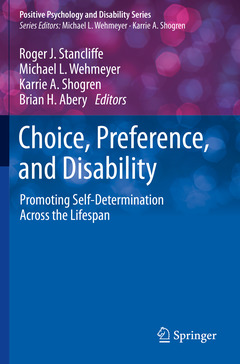Choice, Preference, and Disability, 1st ed. 2020 Promoting Self-Determination Across the Lifespan Positive Psychology and Disability Series

This book examines choice and preference in the lives of people with disability, focusing on people with intellectual and developmental disabilities. It provides an overview of choice and examines foundational concepts related to choice and preference, including self-determination and supported decision making. Chapters examine a range of critical service and policy issues, such as guardianship, individualized funding, the health care system, and the situation regarding choices for people with disability in international contexts. In addition, chapters explore issues ranging from the development of preference and choice in childhood to choices in older age and end of life matters. It provides in-depth analysis of particular choices faced at different points across the lifespan. The book concludes with implications for policy and practice.
Topics featured in this book include:
- Supported decision making for adults with intellectual disabilities or acquired brain injury.
- The role of parents and families in the development of choice-making skills.
- Preference assessments for individuals who cannot tell us what they prefer.
- Employment opportunities for people with intellectual disabilities.
- Sexual and reproductive rights for people with intellectual disabilities.
- Disability and the choice to become a parent.
Choice, Preference, and Disability is an essential resource for researchers, professors, clinicians, therapists, and other professionals as well as graduate students in the fields of developmental and positive psychology, rehabilitation, social work, special education, occupational, speech and language therapy, public health, and healthcare policy.
Roger J. Stancliffe,PhDFAAIDD FIASSIDD is Professor of Intellectual Disability at the University of Sydney’s Centre for Disability Research and Policy. He has an ongoing 25-year affiliation with the Research and Training Center on Community Living at the University of Minnesota. His applied research focuses on making a difference in the everyday lives of people with intellectual and developmental disability, ranging from research on transition to work to studies on ageing. His interests include participation, choice, self-determination, support, and the operation of service systems. He has published extensively and has presented papers at research conferences in five continents. Professor Stancliffe edited the Journal of Intellectual & Developmental Disability from 2003 to 2008. He is the recipient of the 2011 AAIDD Research Award. His most recent book is Transition to retirement: A guide to inclusive practice.
Michael L. Wehmeyer, PhD is the Ross and Marianna Beach Distinguished Professor in Special Education and Chair, Department of Special Education, University of Kansas. He is also Director and Senior Scientist at the Beach Center on Disability, also at KU. His research focuses on issues pertaining to self-determination, the application of positive psychology to the disability context, applied cognitive technologies, and the education of learners with intellectual disability and extensive support needs. He is a Fellow of the American Psychological Association (Division on Intellectual and Developmental Disabilities), the International Association for the Scientific Study of Intellectual and Developmental Disabilities, and the American Association on Intellectual and Developmental Disabilities, the latter of which he is also a past-president. He is currently the President of the Council for Exceptional Children’s Division on Autism and Developmental Disabilities.
Karrie A. Shogr
Examines impact of preference and choice making on self-determination and other valued outcomes for individuals with disabilities
Explores preference and choice within disability service and policy contexts
Discusses key global issues relating to choice (e.g., guardianship, funding, health care systems) across the lifespan
Addresses choice in relation to challenging life domains (e.g., sexuality, parenting, end of life)
Date de parution : 04-2021
Ouvrage de 362 p.
15.5x23.5 cm
Date de parution : 04-2020
Ouvrage de 362 p.
15.5x23.5 cm
Disponible chez l'éditeur (délai d'approvisionnement : 15 jours).
Prix indicatif 168,79 €
Ajouter au panierThèmes de Choice, Preference, and Disability :
Mots-clés :
Aging, disabilities, and choice, Americans with Disabilities Act (ADA), Australian National Disability Insurance Scheme (NDIS) & choice, Choice and preference in healthcare systems, Choice and transition from school to adult life in China, Choice and young children with disabilities, Choice in pre- and post-Soviet Central and Eastern Europe, Choice, disability, and the Israeli welfare state, Choice, employment, and IDD, Choice, parenthood, and IDD, End-of-life choices and disability, Intellectual and developmental disabilities (IDD) and choice, Intellectual disability, choice, family relationships, Irish Longitudinal Study on Ageing (IDS-TILDA), Israel Legal Capacity and Guardianship Law, Quality of life for people with disabilities, Self-advocacy, choice, and developmental disabilities, Self-determination, preference, and choice, Sexual and reproductive health and rights and IDD, Supported decision making and intellectual disabilities



